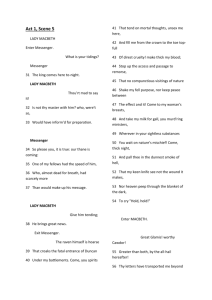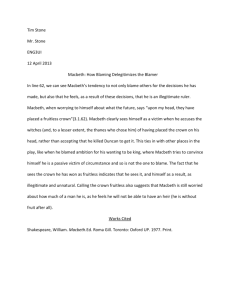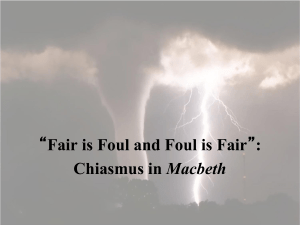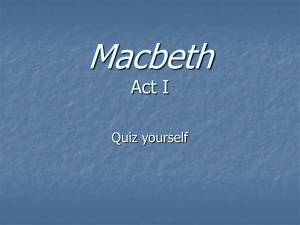Literary Analysis
advertisement
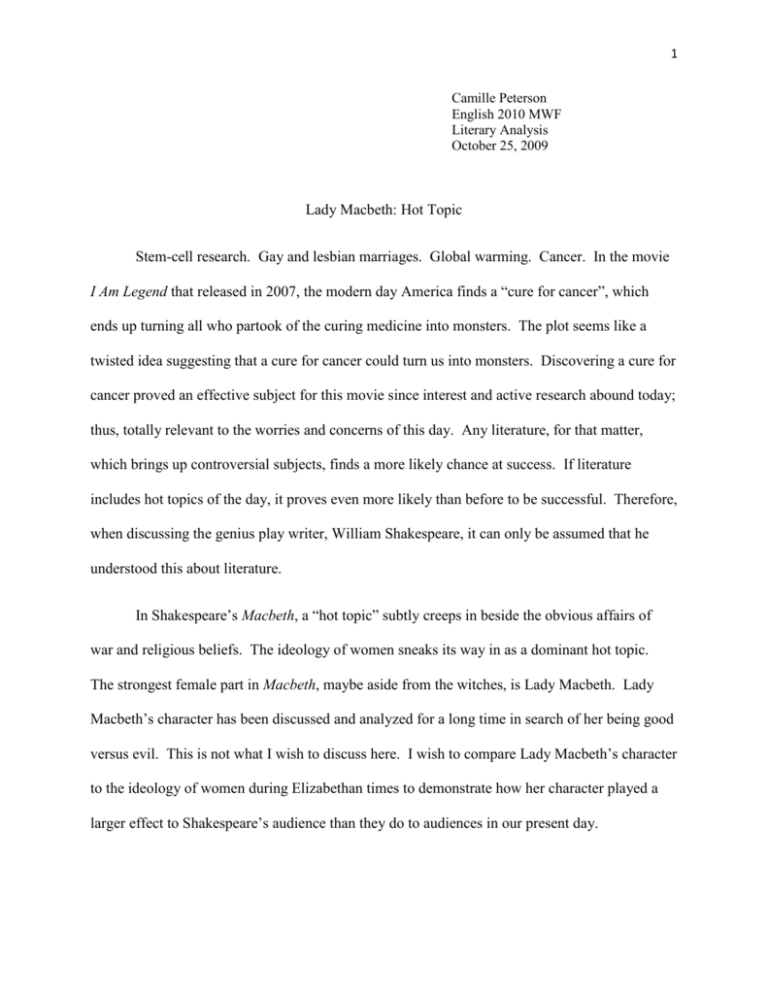
1 Camille Peterson English 2010 MWF Literary Analysis October 25, 2009 Lady Macbeth: Hot Topic Stem-cell research. Gay and lesbian marriages. Global warming. Cancer. In the movie I Am Legend that released in 2007, the modern day America finds a “cure for cancer”, which ends up turning all who partook of the curing medicine into monsters. The plot seems like a twisted idea suggesting that a cure for cancer could turn us into monsters. Discovering a cure for cancer proved an effective subject for this movie since interest and active research abound today; thus, totally relevant to the worries and concerns of this day. Any literature, for that matter, which brings up controversial subjects, finds a more likely chance at success. If literature includes hot topics of the day, it proves even more likely than before to be successful. Therefore, when discussing the genius play writer, William Shakespeare, it can only be assumed that he understood this about literature. In Shakespeare’s Macbeth, a “hot topic” subtly creeps in beside the obvious affairs of war and religious beliefs. The ideology of women sneaks its way in as a dominant hot topic. The strongest female part in Macbeth, maybe aside from the witches, is Lady Macbeth. Lady Macbeth’s character has been discussed and analyzed for a long time in search of her being good versus evil. This is not what I wish to discuss here. I wish to compare Lady Macbeth’s character to the ideology of women during Elizabethan times to demonstrate how her character played a larger effect to Shakespeare’s audience than they do to audiences in our present day. 2 Through the decades, there have been many, many different things perceived in Lady Macbeth. Some say she is the evil mastermind behind the death of Duncan, the mastermind to Macbeth’s rise to the crown and the mastermind to Macbeth’s surrender to evil. Others argue Lady Macbeth was a weak character, who is slowly left alone with no glory or position. How does one judge character? Through one’s thoughts, words, and deeds. Therefore, to better understand Lady Macbeth, studying the things she says to others and to herself appear ultimately the only way to shape her character. When Lady Macbeth first enters the play at Inverness, Macbeth’s castle, she receives the news from Macbeth regarding the witches’ prophecy. She makes her famous speech and plea to receive the capacity to do the evil deed of killing Duncan for Macbeth to receive the crown at this point. She also expresses her worries that her husband will not have what it takes to follow through with Duncan’s murder. In her monologue, she beckons to Macbeth saying, “Hie thee hither, That I may pour my spirits in thine ear, And chastise with the valor of my tongue All that impedes thee from the golden round…” (Shakespeare, 1609). From these words, there is no question of Lady Macbeth having evil intentions. Also from this, Lady Macbeth has no question that she can influence her husband in his actions. Apparently her words influence their relationship in strength and power. She seems to feel an equal in the decisions they make. Later during this same scene, Lady Macbeth asks to be unsexed. She desires to become unholy – to become wicked and able to commit murder. Later, as she tries to toughen up her husband to murder Duncan, she declares her ability to dash the brains out of a smiling infant as she was nursing it if she needed to. Skipping to the final acts of Lady Macbeth in the play, Lady Macbeth struggles to suppress her evil deeds from her memory. This as the case, she goes crazy with hallucinations of blood on her hands unable to rinse clean. Unable to handle the guilt and 3 pressure, she kills herself by means never depicted in the script. Here lie a few of the major points of Lady Macbeth’s character. The ideology of women in England in the Elizabethan era prove different than what Lady Macbeth’s character portrays. During these centuries, women were thought the weaker sex. Joan Larsen Klein declares how they understood women “to be weaker than men in reason and physical strength, prone to fears and subject to the vagaries of their imaginations” (Klein, 1980). Klein shares that, the Bible when discussing the creation, declares “the perfect woman was an afterthought, created later than the perfect man, shaped from his rib in order to forestall his loneliness and to be a ‘helpe meet for him’” (Klein, 1980). Women assumed the role as loving, supportive spouses for their husbands. If their husbands began doing bad things, the wives brought them back into virtuous ways. Women were seen as weak, and not influential. Women received no recognition for having real position or say in their household. The role of simply the caretakers of the infants and hostesses belonged to them. During these Elizabethan times, there was also a ubiquitous anxiety concerning women of this era. Since women were supposed to be the nursing mothers, it was a concern that women would potentially kill their infants, committing infanticide. In fact, in Stephanie Chamberlain paper “Fantasizing Infanticide: Lady Macbeth and the Murdering Mother in Early Modern England,” she demonstrates that there were “existing early modern anxieties about the inherent dangers of maternal agency both to helpless children as well as to a patrilineal system depend upon women for its perpetuation” (Chamberlain, 2006). During these times, it was a concern of society (or more specifically for men of society) that women killed off their offspring. For if they did not have offspring, their lineage would not progress! Apparently, during these times, this was a “hot topic” in society. Amanda Kane Rooks of Central Queensland University, 4 Australia, when writing about Geoffrey Wright’s recent movie with a modern take on Macbeth, quotes Hillary Fogerty who refers to the late sixteenth- and early seventeenth-century as “a historic inability to comprehend the complexity of sex and gender” (Rooks, 2007). Lady Macbeth’s character and the ideology of women during the Elizabethan times contrast. Lady Macbeth had evil intentions for Macbeth to become king by murdering Duncan. Lady Macbeth having these evil intentions plays on a fear of this era. Women are supposed to be quiet, supportive wives. If needs be, they will bring their husbands back to virtuous ways if they start making wrong decisions. Therefore, for Shakespeare to have Lady Macbeth bring up the evil ideas breaks the ideology of women. Women are supposed to be weak in mind, passive contributors to society. Lady Macbeth is blatantly not passive. She has a thought – a deep desire – and she acts determined to carry out her secret plan. This contradicts Elizabethan ideology. A similar contradiction Lady Macbeth makes against Elizabethan ideology is her unconscious declaration that Macbeth will not only listen to her input, but he will succumb to it. This is out of womanly character. No woman should have such position in a household. Lady Macbeth’s character plays into 17th century people’s fears of not only women who could potentially have this kind of influence, but it plays on the fear that this is how women are if you do give them the capacity to be an influence. Lady Macbeth’s claim to be able to “dash the brains out” of a baby she was nursing hits upon a major point (Shakespeare, 1609). A touchy subject for this era, a hot topic of this time comes to light. Literature written for our day and age revolves around what happens in our present time. Therefore, for Shakespeare to address this hot topic in Macbeth, he makes the play all the more meaningful for his 17th century audience. Macbeth proves an even more 5 controversial play during these times than we give it credit for. However, since Lady Macbeth’s character has so far been the opposite of Elizabethan ideology, Shakespeare brings familiar feminine behavior back into Lady Macbeth’s character. This happens in the end of the play when Lady Macbeth sleepwalks trying to wash her hands of the blood that will not come off of her hands. She tries in vain, overcome with guilt. She cannot handle the actions she committed that her sex did not possess. Lady Macbeth’s transition to insanity returns to the ideology of women in the Elizabethan era. This adds a new dimension to Shakespeare’s Macbeth, because it adds to the richness of Lady Macbeth’s character and her effect on Shakespeare’s Elizabethan audience. By making Lady Macbeth’s character consist of an extreme and a familiarity, the audience must embrace the extreme as part of their ideology. Lady Macbeth’s thoughts, words and deeds make them accept the idea that a woman could truly have such evil intentions and influence in her domain. Without a doubt, Lady Macbeth portrays a character who had evil intentions, an unrighteous influence over her husband, and confessions of the ability to commit infanticide. Lady Macbeth inflicts fear and confirms anxieties of people in the Elizabethan era. Her character adds to the effectiveness and richness of Shakespeare’s Macbeth in this era. By looking back at their perceptions and expectations of women in their society, understanding comes on how Lady Macbeth’s character would be more frightening to people during this era than for those who simply perceive her as evil. Lady Macbeth’s character contrasts against the ideology of women during Elizabethan times. The contrast of character and ideology creates a larger effect on Shakespeare’s Elizabethan audience than they do to audiences in our present day. If Shakespeare wrote a drama for our day and age, I’m sure he would include controversies such as global warming, 6 stem-cell research, and abortion. Shakespeare was not only a genius of playwriting, but a genius of his culture, his time, and the hot topics. 7 Works Cited Chamberlain, S. (2005, Summer). Fantasizing infanticide: Lady Macbeth and the murdering mother in early modern England. College Literature, 32 (3), Retrieved from http://web. ebscohost.com.libproxy.dixie.edu/ehost/detail?vid=11&hid=105&sid=6524678f-4c134ec7-9901562d6a0624fb%40sessionmgr111&bdata=JmxvZ2lucGFnZT1sb2dpbi5hc3 Amc2l0ZT1laG9zdC1saXZl#db=aph&AN=17717599. Klein, J. L. (Ed.). (1980). Lady Macbeth: “Infirm of Purpose”. Urbana: University of Illinois Press. Rooks, A. K. (2009). Macbeth’s wicked women: sexualized evil in Geoffrey Wright’s “Macbeth.” Literature Film Quarterly, 37 (2), Retrieved from http://web.ebscohost.com. libproxy.dixie.edu/ehost/pdf?vid=9&hid=105&sid=6524678f-4c13-4ec7-9901-562d6a0 624fb%40sessionmgr111. Shakespeare, W. (1986). The tragedy of Macbeth. New York, NY: Signet Classic.



